Total solar eclipse in USA 2024 live online: Path of totality, reactions, best images and latest news
The day of the solar eclipse is finally here. Here’s all you need to know about the rare celestial phenomenon that can be seen from parts of the U.S.

Show key events only
Solar Eclipse gifts stunning images
Stunning 8 April 2024 solar eclipse
On Monday 8 April, from Mazatlán, Mexico to Newfoundland, Canada, people, including those in 15 US states, witnessed a total solar eclipse. The path of totality was between 108 and 122 miles wide, nearly twice as wide as the 2017 event that crossed the United States from coast to coast.
At its longest day was plunged into night for up to 4 minutes and 28 seconds before the returning. Below are details of the event as it unfolded along with reactions and images captured of the awe-inspiring celestial event.
Related stories
Searches for eye pain have spiked in the wake of the eclipse. Looking directly at an eclipse without appropriate eyewear can lead to eye damage called solar retinopathy which has a range of symptoms.
The heavens aligned Monday 8 April in an event that could “shake up people’s horoscopes.” But, the impact of the solar eclipse may not be felt right away.
NOAA shares images caught of total solar eclipse taken from space
NOAA was monitoring today's total eclipse using GOES satellites. They've released a composite of images taken during the celestial event as it passed over North America.
Crowd goes wild at Indianapolis Zoo during moment of totality
The path of totality swept over Indianapolis at 3:06 pm today. While the animals might have gone quiet for the elestial event, the spectators at the zoo didn't
After traveling through 15 states, the total solar eclipse has ended in the United States. Check out the best images of the phenomenon in the USA.
View of the Sun's corona during 2024 total solar eclipse
NASA's Johnson Space Center has posted shots from the total solar eclipse on Monday where you can see several streamers or prominences of the Sun's corona.
Just before totality begins, beads of sunlight shine through valleys; when those last bits of light pass through the moon’s limb, the edge of the visible surface as viewed from Earth, this vision appears.
See NASA launch rocket into the total solar eclipse
NASA launched three sounding rockets into the solar eclipse's path of totality today to study its effects on the ionosphere.
What does it feel like to experience a total solar eclipse?
The the solar eclipse's area of totality has left the United States and will soon be over the Atlantic Ocean. However, despite the concerns over clouds blocking the view, millions still got to witness the celestial event often described as being magical. Here's what the Weather Channel's Chris Warren had to say about it.
2024 total solar eclipse: Bailey's beads over Arkansas
During these eclipses, three relatively uncommon events often captivate astrology enthusiasts: Baily’s beads, the Diamond Ring, and Sunspots. Baily’s beads, the first of these phenomena, described by National Geographic, are small “beads” or “drops of light” that form along the irregular edge of the Moon as the solar disk either disappears or reappears.
Timelapse video of Dallas as total solar eclipse passes over Knox & Henderson
Dallas was plunged into the momentary darkness of the total solar eclipse at 12:40 pm local time. The before and after was captured in a timelapse video.
2024 total solar eclipse shadow as seen from space moving over Texas
The Geostationary Operational Environmental Satellites (GOES), a collaborative NOAA and NASA program, provides continuous imagery and data on atmospheric conditions and solar activity. NOAA is providing images of the total solar eclipse as seen from space as it traverses North America.
2024 total solar eclipse live
Where and when the total solar eclipse will be over North America
- 11:07 am PT - Mazatlán, Mexico
- 12:23 pm CT - Eagle Pass, Texas
- 12:51 pm CT - Little Rock, Arkansas
- 3:06 pm ET - Indianapolis, Indiana
- 3:14 pm ET - Cleveland, Ohio
- 3:18 pm ET - Buffalo, New York
- 3:26 pm ET - Burlington, Vermont
- 3:32 pm ET - New Brunswick, Canada
2024 total solar eclipse reaches Carbondale, Illinois. Second in 7 years
For most, a total solar eclipse is a once-in-a-lifetime event. But not for those in Carbondale, Illinois. They are in the path of totality for a second time in seven years. However, this time it will be almost twice as long as in 2017 at 4 minutes and 9 seconds.
The first city to see the solar eclipse in its totality was Mazatlán, Mexico and the incredible phenomenon is shown in this beautiful video from NASA.
2024 total solar eclipse: Moon's shadow moving northeast across the United States
The National Weather Service shared satellite imagery of the Moon's shadown moving over North America.
Clouds over Niagara Falls threatening to spoil solar eclipse
The weather forecast for the solar eclipse predicted a high chance of clouds over large swathes of the path of totality across North America threatening to spoil the view of the cosmic event.
So far those in Texas have been able to see the total eclipse through some clouds, however, the "diamond ring" wasn't visible in Kerrville, but Dallas got to see one.
A little humor for the solar eclipse
Gilbert Gottfried shared his "Sun and Moon" joke for the 2024 solar eclipse taking place.
Moment of solar eclipse totality in Mazatlán, Mexico
At 11:07:31 am PDT Mazatlán experienced solar elcipse totality. The first place on land in North America to do so. The total solar eclipse will continue on a northeasterly path toward Eagle Pass, Texas. It will begin there at 12:27:33 pm CDT and last for 4 minutes and 24 seconds.
Solar eclipse path of totality approaching Mazatlán, Mexico
The total solar eclipse will make landfall just south of Mazatlán, Mexico. From there it will speed northeast toward Texas, crossing near Eagle Pass.
The Great North American Total Solar Eclipse is coming. Here’s how you can listen to Pink Floyd's 'The Dark Side of the Moon'in sync with the cosmic event.
Fun phenomenon to watch out for during the total solar eclipse
Solar eclipses are magical events beyond the awe-inspiring moment when the Moon covers the Sun. When you need to give your eyes a break from looking skyward, check out the ground below...
Safety tips for the total solar eclipse
Millions of Americans will be hoping to catch a view of the solar eclipse today. With that in mind, Transportation Secretary Pete Buttigieg shared some safety tips to be prepared.
While the word eclipse is not found in the Holy Book, a number of bible verses appear to make reference to solar and lunar eclipses, conveying messages of prophecies, power, omens, warnings, and divine signs. Here are the main passages in the Bible referencing eclipses.
While the most notable thing that occurs during an eclipse is that darkness falls across the land, a number of other phenomena are often observed, one being the disappearance of clouds. Andy Hall takes a look at why that happens.
What is totality during a solar eclipse?
In the path of totality, where the Moon completely covers the Sun, the sky will become dark, as if it were dawn or dusk.
For those who only experience a partial solar eclipse, the sky will appear slightly darker than it was before the eclipse, depending on how much the Moon blocks the Sun in their location.
First glimpse of the 2024 Great American Total Solar Eclipse over the Pacific Ocean
NASA released the first satelite images of the 2024 Great American Total Solar Eclipse as it begins over the Pacific Ocean near French Polynesia.
NASA provides Solar Eclipse explainer
Curious why we don't see solar eclipses more often? NASA has you covered. Solar eclipses are interesting celestial phenomenon and while not super common, they are able to be predicted with fairly impressive accuracy.
On Monday, 8 April, an eclipse will occur in an area where millions of people will have the chance to see it, and millions more are traveling to the path of totality to catch a glimpse.
Final weather forecast for total solar eclipse 8 April 2024
Mother Nature looks set to spoil the view across large swaths of the path of totality. Cloudy skies could dash the hopes of many solar eclipse watchers in North America who want to catch a glimpse of the Sun being completely covered by the Moon.
Make sure to take care of your eyes
Keep in mind that ordinary sunglasses, even very dark ones, or homemade filters are not safe for looking at the sun.
There is only one safe way to look directly at the sun, whether during an eclipse or not: through special-purpose solar filters. These solar filters are used in “eclipse glasses” or in hand-held solar viewers. They must meet a very specific worldwide standard known as ISO 12312-2.
This tool from NASA will help you plan for the eclipse
Do you live within the path of totality or just outside? This tool, developed by NASA, provides information on when the eclipse is expected to begin, peak, and end in areas across the United States. This can help drivers whose commutes may be disrupted by the traffic caused by the event, too.
The tool also provides information on the weather, and features a countdown clock for those that want to keep close tabs on when the event will get underway.
A total solar eclipse viewed from space
When you're out in space, you don't get to see the sky darken above you. However, you may see a disconcerting black spot moving across the Earth.
Washington DC Mayor Muriel Bowser gives tips for eclipse viewing
While the nation's capital does not fall along the path of totality, many residents may travel to participate in the event. Additionally, a partial eclipse will still be visible from Washington, DC, leading the mayor to provide some tips to residents.
The graphic focuses on safety and how residents can protect their eyes during the celestial event.
The day of the Great North American Eclipse is here.
Although Florida is not in the path of totality, parts of the state may be able to view a partial solar eclipse. Just make sure you use protective eyewear!
While Michigan falls outside the path of totality there are still some opportunities for residents to view a partial solar eclipse on Monday, 8 April.
A major eclipse will be visible to over 30 million people in the United States on Monday, 8 April.
Could cloud cover impact visibility for those in the path of totality?
Mark your calendar...
As millions in the US prepare to view the total solar eclipse on Monday, 8 April, images of all the eclipses to take place in the coming decades are circulating online.
For those who were disappointed that their residence did not land in the path of totality, fret not; there are plenty of eclipses to come where the path will include regions far away from those that will take part in the celestial event on April 8.
Good (partially cloudy) morning Dallas!
Texas is one of the lucky states that will experience totality, but eclipse day has started in Dallas with some clouds. Hopefully the weather will clear up by the time the eclipse begins.
This eclipse is a long time coming...
A paper published in 1970 forecasted this eclipse, with the headline “Millions See Eclipse; Next Showing in 2024.”
The Ohio paper is an example of how these kinds of celestial events have been predicted with fairly high accuracy for decades.
Millions of Americans will be praying for clear skies on Monday 8 April to catch a glimpse of the solar eclipse that will take place over North America. If you want to watch the event, monitor the weather forecast as the conditions of the sky could affect visibility.
Here are the cities with the corresponding times when they will be able to see the eclipse.
Many parts of the US are anticipating the total solar eclipse taking place on April 8.
The celestial event will disrupt the daily routine of many in its path, as many people will make sure they are outside to watch the sky.
If you are flying on that day, be prepared for possible delays.
The total solar eclipse will be visible across parts of the US, and for many animal lovers it is important to know how our friends from the other kingdom can react, as well as the effects that it can have on the behavior of birds, dolphins, chimpanzees, among others.
Some fortunate parts of the United States will witness the total solar eclipse on Monday, April 8. Other states will not have the best view of the event, but they may have better luck next time.
Aside from momentary darkness, the total solar eclipse will bring a burst of bright colors due to a shift in color perception called the Purkinje effect.
Because of this phenomenon, scientists urge eclipse viewers to wear red and green.
NASA is making the most of the total solar eclipse on 8 April, an event that won’t happen over the US again for 20 years.
The space agency will be launching 3 rockets into its path.
The 2024 eclipse is expected to last twice as long and be twice as wide as the last event in 2017.
Make sure you don't miss the event, even if you won't have the chance to see it in person.
Unlike a regular old new moon, the eclipse will unleash intense energy impacting zodiac signs and shaking things up. These will be the most affected signs, according to astrology.
Weather outlook for solar eclipse day
Even if you are lucky enough to be in the path of totality, weather conditions might hamper your view of the rare total solar eclipse.
Here's The Weather Channel's outlook for the big day.
A total solar eclipse is an impressive spectacle when viewed from the Earth, but a select few get front row seats to another perspective of the phenomenon.
The event looks very different when seen from outer space.
New York prepares for eclipse traffic
The Department of Transportation in New York is hard at work to inform drivers of the upcoming eclipse so that residents and visitors alike know what to expect. For many, Monday will be a regular work day, and for others it will be a day dedicated to viewing the eclipse.
Commuters should ensure that they are not going to encounter massive traffic jams either before, during, or after the event, and should plan ahead to avoid such a scenario.
NASA to skygazers: Protect your eyes during the eclipse!
NASA is reminding everyone to use protective eyewear while watching the total solar eclipse. All sky watchers must wear ISO-certified eclipse-viewing glasses if they intend to look at the sun directly. Avoid permanent eye damage!
Millions of people in the United States will be able to witness the solar eclipse on Monday 8 April. While in some parts of the country it will be a total solar eclipse, in others only a partial eclipse will be observed.
However, in both cases it is necessary to have the appropriate equipment to be able to witness the awe-inspiring celestial event, including the use of special glasses. If they are not used it could be dangerous. We explain why.
The much-awaited solar eclipse will be taking place on Monday. California is not in the path of totality, but some parts will witness a partial eclipse.
Here are some areas in the Golden State where you can catch it.
Americans are gearing up to observe one of the most spectacular astronomical events.
There was one such occurrence seven years ago, but the total solar eclipse on 8 April 2024 will be even better than the one that took place in 2017.
While total solar eclipses happen on a regular basis, for most it’s a once-in-a-generation event since the chance of occurring over the same place is rare.
On Monday, April 8, Texas will be one of the fortunate states that will be able to witness a total solar eclipse.
The total solar eclipse will pass through the Lone Star State.
Dozens of schools across Texas won’t be holding classes on Monday 8 April giving students a chance to enjoy the total solar eclipse with their families.
One of the most magnificent celestial events is coming but to safely gaze upon the solar eclipse you’ll need special glasses.
Here’s where to get them free, if you are watching from New York.
Scores of schools across New York won’t be holding classes on Monday 8 April giving students a chance to enjoy the total solar eclipse with their families.
Millions of Americans are eagerly awaiting the total solar eclipse on 8 April. Many will want to immortalize the moment with a photo.
Viewing a solar eclipse without the right eyewear can cause permanent eye damage.
Here’s where to get a free pair of special glasses in the Keystone State.
Millions of American will take time out of their day on Monday 8 April to go outside and catch a glimpse of the solar eclipse that will take place. However, without the proper eye protection direct observation of a solar eclipse can cause permanent damage to your eyes.
Experts warn to watch out for fake safety glasses to observe the celestial event. Here’s how to spot them.
Over a dozen states will bear witness to the total solar eclipse taking place on April 8. Those who live in these areas may experience cell service disruptions.
As millions gather to see the celestial coming together of the Sun and the Moon, there will be some interesting aspects to keep an eye out for.
One phenomenon worth observing is the appearance of "Baily's beads".
Millions of Americans will turn their gaze to the sky on Monday 8 April for the total solar eclipse.
A device will let those without sight enjoy the event too, it's called the LightSound device.
Believers in the utterly disproven theory of a flat-earth are claiming the upcoming total solar eclipse in the United States helps explain their ideas.
Weather alert for Kentucky
Conditions for viewing the eclipse are looking better in Kentucky, according to Weather Now - Kentucky. Those on the easternmost border of the state are in the path of totality, providing a once-in-a-lifetime viewing experience.
It is still critical that those hoping to view the eclipse wear protective gear to protect their eyes from the sun.
Parts of the United States will have a great view of the solar eclipse to take place on 8 April... others... won’t see a thing.
Millions have made plans to be in the path of totality for the 8 April solar eclipse. Mother Nature will have the final word on whether it will be visible.
Americans across the US will soon have a chance to witness a total solar eclipse.
Here’s what you need to know: date, time, route and where best to see it.
When will the NASA live stream for the eclipse begin?
NASA will begin its live stream of the historic eclipse at 1 p.m. ET on Monday, 8 April. It will be bringing pictures and videos from locations across the path of totality and explaining the science behind the major celestial event.
There are a couple of viewing options for the live stream that can be viewed in the thread posted below.
Hello and welcome to the AS USA live blog for the 2024 total solar eclipse
It's finally the big day of the once-in-a-lifetime celestial spectacle as the Moon moves into position between the Earth and the Sun. On Monday 8 April the Great North American Total Solar Eclipse of 2024 is taking place, with the path of totality stretching from Mazatlán, Mexico to Maritime Canada, crossing 15 US states in the process.
We’ll keep you up to date on the latest weather forecasts, with Mother Nature threatening to dampen the awe-inspiring event for portions of the country, as well as all you need to know about the solar eclipse to have the best viewing experience.
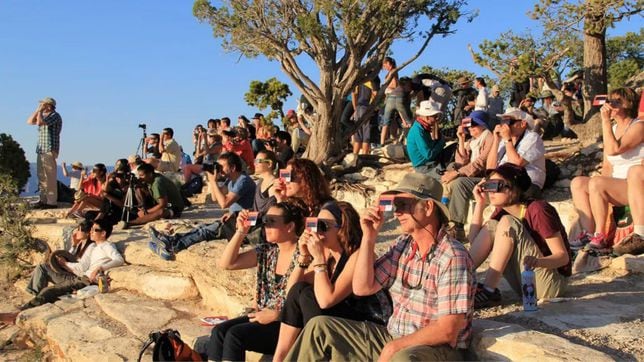

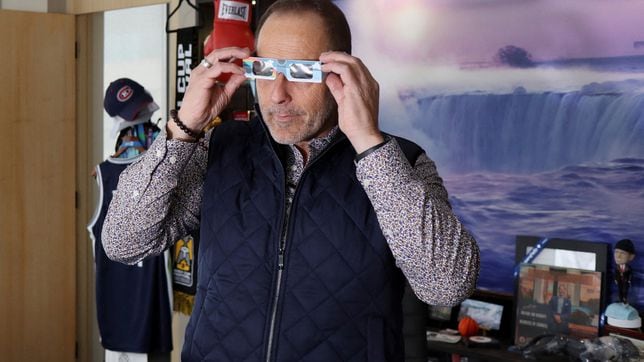
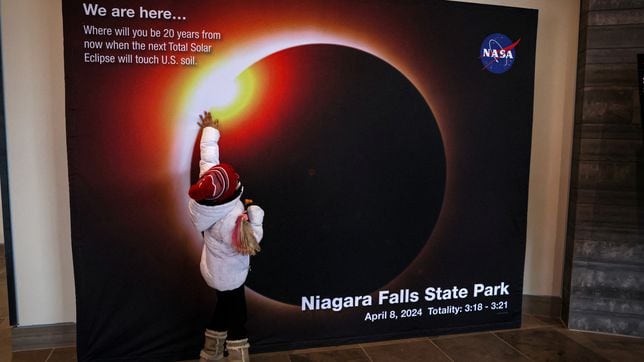












/cloudfront-eu-central-1.images.arcpublishing.com/diarioas/PFJNHBNKTJZ7I3FVFZFEZL2UTQ.jpg)
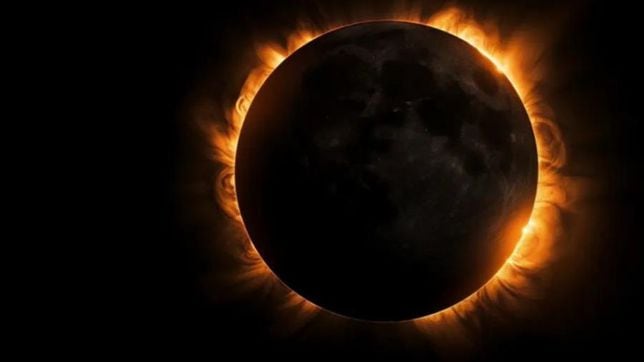
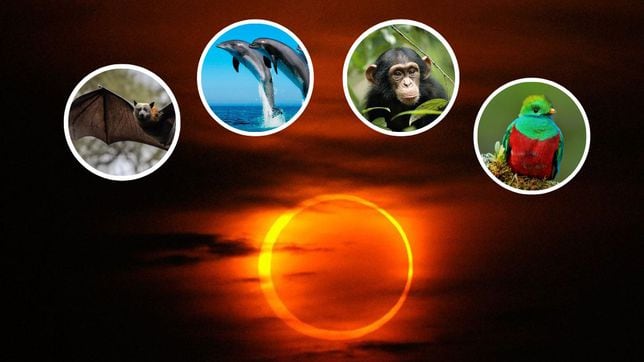




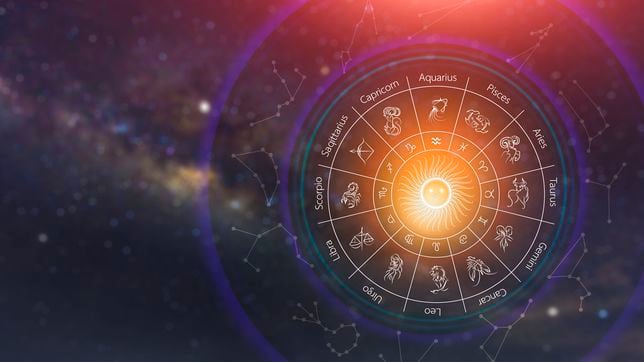
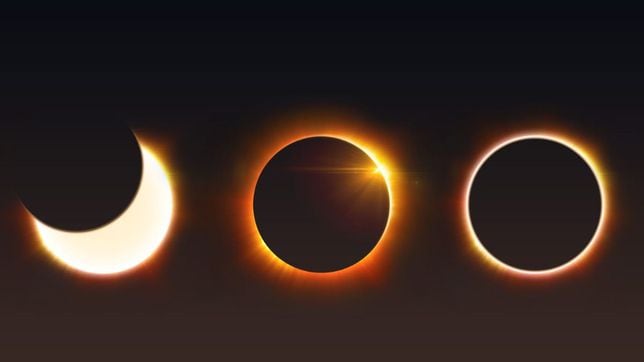
/cloudfront-eu-central-1.images.arcpublishing.com/diarioas/76BUPOQ2BVD3LLSEHQERLVDB5Q.jpg)

/cloudfront-eu-central-1.images.arcpublishing.com/diarioas/JF4FGQCSQFZREVDEH37RFMLX6Q.jpg)
/cloudfront-eu-central-1.images.arcpublishing.com/diarioas/PFYTZFWSC5CS7OBCLGUBVUU5YI.jpg)
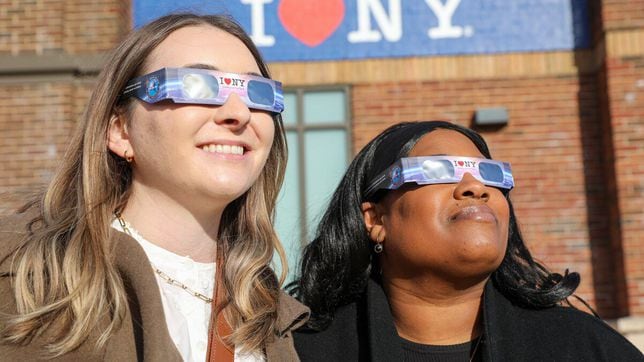





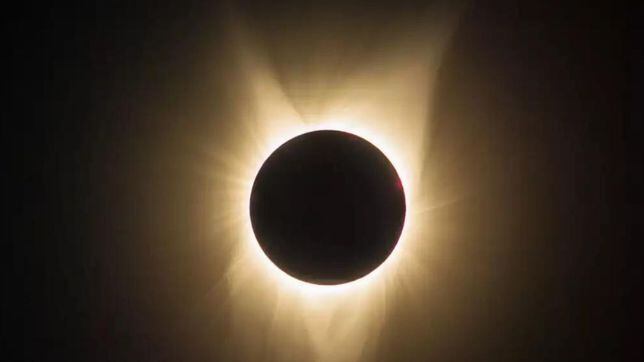
Complete your personal details to comment